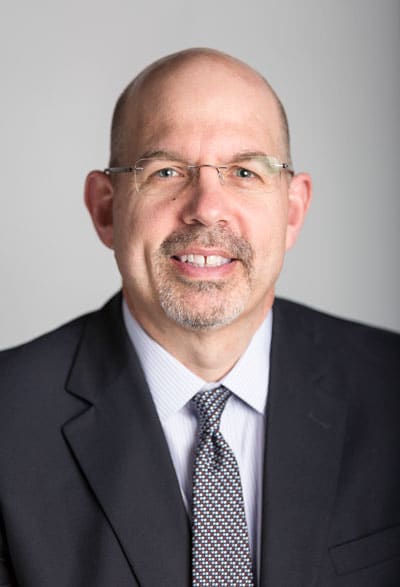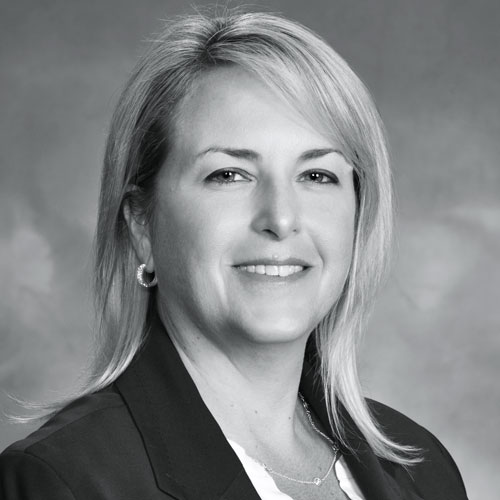Edward Angelini believes that coaching basketball can offer lessons for effective legal leadership. In fact, he points to former Chicago Bulls coach Phil Jackson. Jackson molded his Bulls championship teams not only by coaching star players like Michael Jordan but also by mentoring supporting players like Steve Kerr.
“Kerr was a great three-point shooter,” Angelini explains. “He knocked down three-point shots when defenses collapsed on Jordan. Even though it was a more limited role than Kerr might have enjoyed on another team, part of Jackson’s success relied on instilling in Kerr the understanding that it was better for him to fulfill that role on a highly successful team.”

Phil Jackson knew what was good for the Bulls was ultimately good for all the individual players. It is not surprising that today Kerr is the head coach of the NBA’s reigning champion and best team, the Golden State Warriors. Likewise, an effective manager must persuade his team that successfully fulfilling roles will improve results for everyone involved. “That to me is leadership—getting someone to see how doing the best for the organization aligns with their individual goals and interests,” he says. This team-centered management philosophy—combined with technical expertise, creative problem solving, and trust of clients—drives Angelini’s success.
As the head of the corporate transactional group, associate general counsel, for Purdue Pharma L.P., Angelini optimizes business results and advises executive management on strategic corporate transactions. In fact, about 95 percent of all contracts are negotiated through Angelini’s group, and Angelini and his team counsel on all of Purdue’s transactional activity, which includes licensing, mergers and acquisitions, finance, and general corporate transactions. He and his team are intimately involved in the commercial aspects of the company, advising on evaluating prospective business deals, negotiating and executing those deals through the closing, and helping integrate new acquisitions into the existing organizational structure.
Before his career as an in-house lawyer, Angelini was first drawn to the idea of becoming a lawyer while he was attending Amherst College. The practice of law, as a discipline, seemed like a natural continuation and an ideal intersection of his academic interests—English, political science, history, and philosophy—and it fit his aptitude for analytical and creative problem solving. So he decided to pursue a JD at Boston University, and after graduation, he worked at law firms for almost nine years. “It was an excellent experience and excellent training, but I was often getting a term sheet that was fully negotiated,” he says. “No matter how close you were to a client, you were often one or two steps removed from the real strategic decision making driving business development opportunities.”
Instead, Angelini wanted to work with clients from the beginning to the end of a transaction and help them incorporate acquisitions into their business. Working as in-house counsel allowed Angelini the opportunity to do exactly that. His first in-house role came at Transamerica Technology Finance Corporation before he moved to Purdue. Although he didn’t have much direct experience in the pharmaceutical industry at the beginning of his transition to an in-house counsel role, he liked that healthcare was a dynamic, evolving industry where he could learn the business and acquire marketable skills. He was impressed, in particular, by the strength of Purdue Pharma’s law department, the critical role that the department played in key strategic business initiatives, and the opportunity to make an impact.
Now, more than fourteen years later, Angelini is still fascinated with the complexity of his work. The role enables him to provide counsel on sophisticated transactions where potentially hundreds of millions of dollars are at stake. The transactions Angelini works on are highly sophisticated and involve a lot of moving parts. He says he succeeds by finding solutions to unanticipated problems and avoiding the inflexible role of an attorney who simply recites rules and tells people no. And much like a professional athlete, Angelini finds the intense pressure stimulating. “The job gives me the opportunity to practice at a very high end of my profession,” Angelini says. “Not every lawyer gets the opportunity to work on multimillion-dollar deals or work on transactions that are critically and strategically important.”
Throughout his career, Angelini has worked with a wide array of management styles and personalities. The key to building effective working relationships with anyone, he says, is trust. One component of that is having a strong work ethic. “Clients want to see that you are working hard for them—that you are plugging away on a daily basis,” he says. “They want to know that you’ll get it done in a timely manner. That, along with demonstrating good judgment over a period of time, is all part of building trust.”
Another component that helps Angelini build trust is being approachable and easy to work with. He recommends that attorneys be relatable to their clients. “Be a person people enjoy working with and talking with,” he says. Someone with an approachable demeanor is far more likely to gain a client’s trust and, therefore, create more effective working relationships.
In addition to the exciting work, Angelini credits his longevity with Purdue Pharma to being able to coach such an excellent team of lawyers and paralegals. And like all good coaches, Angelini keeps the long-term outcomes of his team in the forefront of his mind. It is, perhaps, the most rewarding aspect of his job. “It’s been great to be part of a professional, motivated team that’s working on delivering strategic, important results for the organization,” he explains. “Most of the real rewards come from being part of that team. I am fortunate to report into a great general counsel and to have excellent and talented colleagues on my team.”
Photo by Henry Veloso


